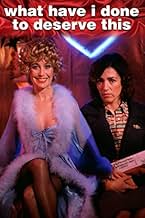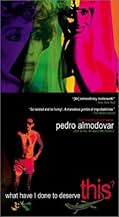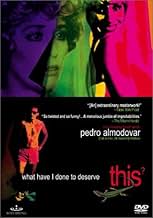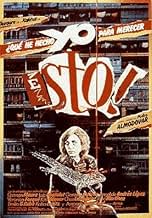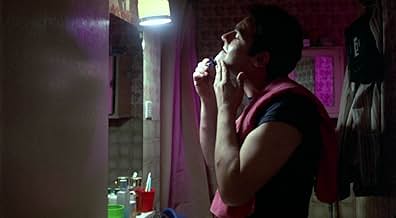Che ho fatto io per meritare questo?
Titolo originale: ¿Qué he hecho YO para merecer esto!!
VALUTAZIONE IMDb
7,1/10
11.766
LA TUA VALUTAZIONE
Le vicissitudini di Gloria, una casalinga nevrotica, e della sua peculiare famiglia.Le vicissitudini di Gloria, una casalinga nevrotica, e della sua peculiare famiglia.Le vicissitudini di Gloria, una casalinga nevrotica, e della sua peculiare famiglia.
- Premi
- 5 vittorie e 1 candidatura in totale
Gonzalo Suárez
- Lucas Villalba
- (as Gonzalo Suarez)
Ángel de Andrés López
- Antonio
- (as Angel de Andres-Lopez)
Kiti Mánver
- Juani
- (as Kiti Manver)
Sonia Hohmann
- Vanessa
- (as Sonia Anabela Holimann)
Pedro Almodóvar
- Play-Back 'La bien pagá'
- (as Almodovar-McNamara)
Fabio McNamara
- Play-Back 'La bien pagá'
- (as Almodovar-McNamara)
Miguel Ángel Herranz
- Miguel
- (as Miguel Angel Herranz)
Recensioni in evidenza
Pedro Almodóvar's 1984 film What Have I Done to Deserve This!? is as much as a mouthful as it is to say as it might be to entirely summarise. The sheer extravagancy of the title, which is '¿Qué he hecho yo para merecer esto!!' in Spanish, echoes the broad and rather open canvas on which the breakthrough Spanish director paints his portraits and the fates of an equally rather disparate group of Spaniards tumbling out of Franco's Spain. The setting is 1980s Madrid, the capital of a nation that has since come out of a political reign of a definitive sort and is now on the brink of ending three quarters of a decade under a fresher, freer political situation. This as the film covers two groups, indeed families or classes, whom have progressed out of the old times and into the new ones. As a whole, the film works as a somewhat sly comedy and pays substantial attention to Spain as a nation by way of its capital city and those that inhabit it.
The film opens with a collection of odd, colourful titles which is in direct contrast in terms of basic codes and conventions to the activity going on behind it; that being of a martial art variety in which shouting and the flinging around of wooden poles as a dozen or so people twist and turn in perfect unison is played out. Gloria (Maura), a middle-aged cleaner whom works at the recreation hall in which these people practice, reenacts what she observes in what is a rare moment during which we see her doing something that seems planned, ordained and conclusive. This fleeting moment of control and rhythm we see her engage in is in stark contrast to her chaotic home life, in which she must contend with two teenage sons whom are either homosexual or dealing drugs in their spare time; a brute of a husband, named Antonio (López), who wants to be with another woman but when he is with Gloria, makes love to her despite close family members being in near proximity as well as a mother-in-law named Abuela (Lampreave), who comes with her own quirks.
What Have I Done to Deserve This!? works as a character piece exploring the women in the film such as Gloria, her mother-in-law and neighbour Cristal (Forqué), who's additionally a prostitute. Most of the women in the film are good-natured and tend to lean more towards helping and aiding others as they stick together, their existence playing out amidst men, or indeed male characters, of whom are deeply flawed in their characteristics and attitudes as domestic violence; confusion over sexuality; paedophilia; drug infused lifestyles and infidelity are the majority of characteristics they embody.
Despite the sheer level of characters in the film, Almodóvar does a credible job in balancing the right amount of both introduction and progression required for each person. Antonio, for instance, is established to have known a German woman who was someone that was into Nazi memorabilia, but whom he drove around as a chauffeur many years ago and developed a bond with anyway. This, followed by scene in which he reiterates the importance of one's signature on a level with one's surname to one of his sons; an exchange in which the aim is to evoke a sense of individualism and identity, that you are one amongst the rest and ought to be proud of who you are. The link to the woman affiliated with the aforementioned woman is still fresh and sets up a relatively unnerving sense about Antonio, something that additionally arises later on to do with forgery of a German manuscript.
The characters in What Have I Done to Deserve This? walk rainy, grey and unwelcoming Spanish streets; the film is shot in a manner that acts as an anti-thesis to how tourists view Spain. The majority of the people in the film are poor; indeed Gloria's dysfunctional family we zero in on for the duration of the film turn to counterfeiting and drug dealing to sustain an income. Next door, Cristal entertains a number of male clients; one of which very early on is a supposedly well-off writer whose financial situation doesn't seem as desperate as everyone else's, but this doesn't, in any way at all, elevate him above those of Gloria's family as his infidelity and ideas of a criminal nature play out.
The film, in the nicest possible way, feels like three or four going on at once. There are moments, indeed a number of premises, which you feel would make films all by themselves; situations that Almodóvar could flesh out even more than what he does. This echoes what he does in his 2006 piece entitled Volver, in which three women come about a series of bizarre incidences but just seem to act around them rather than act because of them. Almodóvar does this as a director; keeping everything as low key as possible as content of a pretty disturbing nature such as the murder of one's partner and a drug dealing teenager just seems to 'happen' around this housewife and middle aged woman who lives in a crazy, mixed up world. Almodóvar doesn't exploit these things for sake of cheap laughs, instead opting to point out that these problems contained within Spain's society are still prominent, regardless of what positives one might take out of it being a decade on from Franco's regime. The film operates as a rather black comedy, as a somewhat stripped down drama with its fair share of powerful moments and as an interesting case study between classes and gender.
The film opens with a collection of odd, colourful titles which is in direct contrast in terms of basic codes and conventions to the activity going on behind it; that being of a martial art variety in which shouting and the flinging around of wooden poles as a dozen or so people twist and turn in perfect unison is played out. Gloria (Maura), a middle-aged cleaner whom works at the recreation hall in which these people practice, reenacts what she observes in what is a rare moment during which we see her doing something that seems planned, ordained and conclusive. This fleeting moment of control and rhythm we see her engage in is in stark contrast to her chaotic home life, in which she must contend with two teenage sons whom are either homosexual or dealing drugs in their spare time; a brute of a husband, named Antonio (López), who wants to be with another woman but when he is with Gloria, makes love to her despite close family members being in near proximity as well as a mother-in-law named Abuela (Lampreave), who comes with her own quirks.
What Have I Done to Deserve This!? works as a character piece exploring the women in the film such as Gloria, her mother-in-law and neighbour Cristal (Forqué), who's additionally a prostitute. Most of the women in the film are good-natured and tend to lean more towards helping and aiding others as they stick together, their existence playing out amidst men, or indeed male characters, of whom are deeply flawed in their characteristics and attitudes as domestic violence; confusion over sexuality; paedophilia; drug infused lifestyles and infidelity are the majority of characteristics they embody.
Despite the sheer level of characters in the film, Almodóvar does a credible job in balancing the right amount of both introduction and progression required for each person. Antonio, for instance, is established to have known a German woman who was someone that was into Nazi memorabilia, but whom he drove around as a chauffeur many years ago and developed a bond with anyway. This, followed by scene in which he reiterates the importance of one's signature on a level with one's surname to one of his sons; an exchange in which the aim is to evoke a sense of individualism and identity, that you are one amongst the rest and ought to be proud of who you are. The link to the woman affiliated with the aforementioned woman is still fresh and sets up a relatively unnerving sense about Antonio, something that additionally arises later on to do with forgery of a German manuscript.
The characters in What Have I Done to Deserve This? walk rainy, grey and unwelcoming Spanish streets; the film is shot in a manner that acts as an anti-thesis to how tourists view Spain. The majority of the people in the film are poor; indeed Gloria's dysfunctional family we zero in on for the duration of the film turn to counterfeiting and drug dealing to sustain an income. Next door, Cristal entertains a number of male clients; one of which very early on is a supposedly well-off writer whose financial situation doesn't seem as desperate as everyone else's, but this doesn't, in any way at all, elevate him above those of Gloria's family as his infidelity and ideas of a criminal nature play out.
The film, in the nicest possible way, feels like three or four going on at once. There are moments, indeed a number of premises, which you feel would make films all by themselves; situations that Almodóvar could flesh out even more than what he does. This echoes what he does in his 2006 piece entitled Volver, in which three women come about a series of bizarre incidences but just seem to act around them rather than act because of them. Almodóvar does this as a director; keeping everything as low key as possible as content of a pretty disturbing nature such as the murder of one's partner and a drug dealing teenager just seems to 'happen' around this housewife and middle aged woman who lives in a crazy, mixed up world. Almodóvar doesn't exploit these things for sake of cheap laughs, instead opting to point out that these problems contained within Spain's society are still prominent, regardless of what positives one might take out of it being a decade on from Franco's regime. The film operates as a rather black comedy, as a somewhat stripped down drama with its fair share of powerful moments and as an interesting case study between classes and gender.
Off-the-wall typical Spanish housewife (Carmen Maura , though Esperanza Roy and Concha Velasco turned down the role) is an lowly maid in Madrid , here she scrapes to get by and help her two useless sons , a young junkie called Javi and a gay boy who sleeps with men , living in a crowded as well as small apartment with her self-reliant grandma (Chus Lampreave) and Antonio (Angel Andres Lopez) , her sadist husband , a Taximan and also a forger who adores an aging German singer named Ingrid Muller (Katia Loritz) he used to chauffeur . One teen son is a druggie and sells dope , the other has rare hobbies and Gloria subsequently has given away in adoption . As her family situation goes from bad to worse , her travails inspire other people and befriends her next door prostitute named Crystal (Veronica Forque , though Angela Molina and Victoria Abril turned down the role , as the latter didn't want to play another whore , having just played one recently) . Gloria works as a maid , cleaning houses for bourgeois families (Gonzalo Suarez , Amparo Soler Leal) and craves a better life . Two alcoholic men cook up a scheme to sell a manuscript as Hitler's memoirs, if the taxi-driver will transcribe it in Hitler's hand . Antonio agrees, so they ask the German singer Muller (Katia Loritz) to play the character of the original owner since her past affinity for Nazi memorabilia makes her a likely candidate .
Agreeable film full of feeling , outlandish characters , haunting mood-pieces , Spanish Neo-realism , fun scenes, strange humor and sense of style but not totally satisfactory , including conventional pitfalls . The picture deals with drama , off-the-wall comedy , absurdities familiar , mad inversions , murder by Hambone and many other things ; featuring a feminist heroine of classical proportions . The picture is pretty well but turns out to be inferior to Almodovar's previous and subsequent entries . The result is undiluted scabrous comedy , profanities , perverted sex with short , sharp images and a crazy strings of plots . It's a piquant look at lower classes involving twists and an intrigue about the forging of Hitler's diaries and keeping a neighbour company during her bonking hour . Nice interpretations by all cast , as Carmen Maura as Gloria , mother of a dysfunctional family in Madrid , she is a cleaning lady , Maura playing very well her various trials and escapades , Angel De Andres Lopez as her surly husband cabby , Chus Lampreave as weird mother-in-law who picks up a pet lizard and keeps bottled water and cupcakes under lock and key . Furthermore , Kiti Manver , Gonzalo Suarez , Emilio Gutierrez Caba , Cecilia Roth , Veronica Forque , Javier Gurruchaga as a sex-crazed dentist and other delightfully played roles .
The motion picture was realized in his traditional style by Pedro Almodovar ; he often uses symbolism and metaphorical techniques to portray circular story lines . Almodovar directs throughout with splendid zip and he usually portrays strong female characters and transsexuals . His first feature film, Pepi, Luci, Bom (1980), was made in 16 mm and blown-up to 35 mm for public release. In 1987, he and his brother Agustín Almodóvar established their own production company: El Deseo, S. A. The "Almodóvar phenomenon" has reached all over the world, making his films very popular in many countries. Pedro subsequently made successes such as Labyrinth of passions , Law of desire , Women Women on the verge of a nervous breakdown , Bad education , All about my mother , Talk to her , Broken embraces , The Skin I Live In and many others .
Agreeable film full of feeling , outlandish characters , haunting mood-pieces , Spanish Neo-realism , fun scenes, strange humor and sense of style but not totally satisfactory , including conventional pitfalls . The picture deals with drama , off-the-wall comedy , absurdities familiar , mad inversions , murder by Hambone and many other things ; featuring a feminist heroine of classical proportions . The picture is pretty well but turns out to be inferior to Almodovar's previous and subsequent entries . The result is undiluted scabrous comedy , profanities , perverted sex with short , sharp images and a crazy strings of plots . It's a piquant look at lower classes involving twists and an intrigue about the forging of Hitler's diaries and keeping a neighbour company during her bonking hour . Nice interpretations by all cast , as Carmen Maura as Gloria , mother of a dysfunctional family in Madrid , she is a cleaning lady , Maura playing very well her various trials and escapades , Angel De Andres Lopez as her surly husband cabby , Chus Lampreave as weird mother-in-law who picks up a pet lizard and keeps bottled water and cupcakes under lock and key . Furthermore , Kiti Manver , Gonzalo Suarez , Emilio Gutierrez Caba , Cecilia Roth , Veronica Forque , Javier Gurruchaga as a sex-crazed dentist and other delightfully played roles .
The motion picture was realized in his traditional style by Pedro Almodovar ; he often uses symbolism and metaphorical techniques to portray circular story lines . Almodovar directs throughout with splendid zip and he usually portrays strong female characters and transsexuals . His first feature film, Pepi, Luci, Bom (1980), was made in 16 mm and blown-up to 35 mm for public release. In 1987, he and his brother Agustín Almodóvar established their own production company: El Deseo, S. A. The "Almodóvar phenomenon" has reached all over the world, making his films very popular in many countries. Pedro subsequently made successes such as Labyrinth of passions , Law of desire , Women Women on the verge of a nervous breakdown , Bad education , All about my mother , Talk to her , Broken embraces , The Skin I Live In and many others .
By far not my best Almodovar film, but it is a winner as is! The more films I get to see from this one-of-a-kind (as all pioneers!) director, the more I love his work.
In this 4th film of his, he starts out with his usual absurd, peculiar humour and his trademark hilarious characters. If you have seen any of these other films of his: 'Pepi, Luci, Bom and Other Girls on the Heap', 'Labyrinth of passion', 'Kika', 'Matador', 'Women on the Verge of a Nervous Breakdown' plus more, you know what to expect. Almodovar humour is unique and it's here. The big difference in this one is that from a point and on, Almodovar fits in a sad tone, slowing the pace down and converting the film to a drama half-way - despite the fact he does not leave out some humour element - in this very special Almodovar way.
I suppose this should do also for people who didn't like half of Almodovar films (the more offensive ones), maybe because things are more serious in this or maybe because one can distinguish the director's point more easily than in other, more hillariously absurd, almost surreal ones.
In this 4th film of his, he starts out with his usual absurd, peculiar humour and his trademark hilarious characters. If you have seen any of these other films of his: 'Pepi, Luci, Bom and Other Girls on the Heap', 'Labyrinth of passion', 'Kika', 'Matador', 'Women on the Verge of a Nervous Breakdown' plus more, you know what to expect. Almodovar humour is unique and it's here. The big difference in this one is that from a point and on, Almodovar fits in a sad tone, slowing the pace down and converting the film to a drama half-way - despite the fact he does not leave out some humour element - in this very special Almodovar way.
I suppose this should do also for people who didn't like half of Almodovar films (the more offensive ones), maybe because things are more serious in this or maybe because one can distinguish the director's point more easily than in other, more hillariously absurd, almost surreal ones.
I found myself wrapped up in this off-beat movie, off-beat that is, for anyone but Almodóvar in the mid 1980s. For him, this one was sort of tame. It's populated by an Almodovaran crowd of demimonde, and struggling proletarians and intellectuals. Some take drugs to get by, some sell drugs but won't take them. Sex is a commodity, and honor a dubious value. The struggle to survive in a harsh urban environment ought not be as comic as this often is, so it's not surprising when Almodóvar brings a little emotional sustenance to leaven the pessimism. But nobody in this film should be taken at face value, least of all the director, and nothing should be taken too seriously. It's fun, and in the end, that's enough.
I loved this. It isn't so great compared to later projects where he knows how to use knives instead of chalk. And he decides to understand women, instead of understanding their luggage.
But this is better in a way because you can see the man, what a friend calls the exposed plumbing of what later would become a polished structure.
Stories in Almodovar's soul, that wonderful soul, appear first as images that only after they crack their shells into the fluttering wind of sight do they loose into their narrative trajectory. Sight first, then narrative. But because the narrative comes directly from the cinematic, it flows with an unusual naturalness. It drives into complexities, even emotion depths. It becomes surreal in places, but it all seems natural because it flows from the image within.
And that gives us another advantage. Nearly all films about love and women begin all their major strokes from the written or spoken word and the situations that grow out of them. That means in film that we are stuck with a limited vocabulary and set of patterns that not only dull with repetition, but aren't cinematic at root.
Even in this early film, you can see that because these eyesweets were never touched by pen, they are all fresh without leaving what we accept as true. Its quite an achievement.
The standout performance? A ten year old redhead with "powers," and around whom everything happens. She may be the cause.
Ted's Evaluation -- 3 of 3: Worth watching.
But this is better in a way because you can see the man, what a friend calls the exposed plumbing of what later would become a polished structure.
Stories in Almodovar's soul, that wonderful soul, appear first as images that only after they crack their shells into the fluttering wind of sight do they loose into their narrative trajectory. Sight first, then narrative. But because the narrative comes directly from the cinematic, it flows with an unusual naturalness. It drives into complexities, even emotion depths. It becomes surreal in places, but it all seems natural because it flows from the image within.
And that gives us another advantage. Nearly all films about love and women begin all their major strokes from the written or spoken word and the situations that grow out of them. That means in film that we are stuck with a limited vocabulary and set of patterns that not only dull with repetition, but aren't cinematic at root.
Even in this early film, you can see that because these eyesweets were never touched by pen, they are all fresh without leaving what we accept as true. Its quite an achievement.
The standout performance? A ten year old redhead with "powers," and around whom everything happens. She may be the cause.
Ted's Evaluation -- 3 of 3: Worth watching.
Lo sapevi?
- QuizVictoria Abril turned down the role of Cristal, as she didn't want to play another prostitute, having just played one recently.
- ConnessioniFeatured in Storia del cinema: Un'odissea: European New Wave (2011)
I più visti
Accedi per valutare e creare un elenco di titoli salvati per ottenere consigli personalizzati
- How long is What Have I Done to Deserve This??Powered by Alexa
Dettagli
Botteghino
- Lordo in tutto il mondo
- 690 USD
- Tempo di esecuzione1 ora 41 minuti
- Mix di suoni
- Proporzioni
- 1.85 : 1
Contribuisci a questa pagina
Suggerisci una modifica o aggiungi i contenuti mancanti

Divario superiore
By what name was Che ho fatto io per meritare questo? (1984) officially released in India in English?
Rispondi
![Guarda Tráiler [OV]](https://m.media-amazon.com/images/M/MV5BYTM3Y2Q4NTMtZDZmZC00M2E3LWE2ZmQtZWQzM2Q4NjIyNWU1XkEyXkFqcGdeQXRyYW5zY29kZS13b3JrZmxvdw@@._V1_QL75_UX500_CR0)

